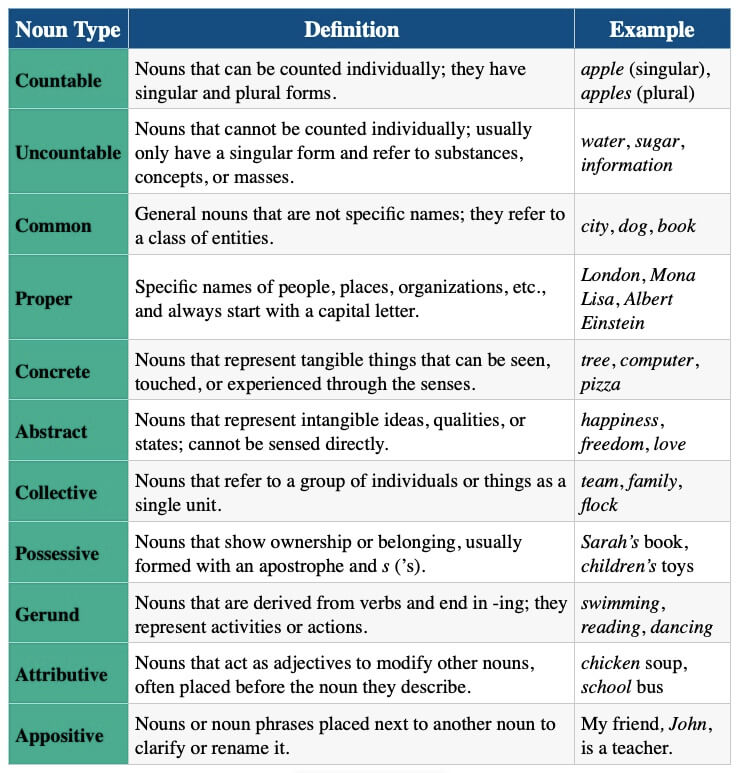- Home
- Types of Noun
Types of Noun with Examples
In this lesson we consider the various types of noun with examples. When it comes to language and linguistics, a fundamental foundation is the understanding of 'Nouns.'
In essence, nouns are words that denote a person, place, thing or idea. They are building blocks of sentences, vital in identifying objects, people, places or ideas.
They give names to beings (like 'teacher'), places ('Paris'), things ('book'), qualities ('honesty'), or actions ('dreaming'). Let's explore the different types of noun with examples.
Types of Noun
Countable and Uncoutable Nouns
Countable Nouns
First, let's start with 'Countable and Uncountable Nouns'. Countable nouns are items that you can count quantitatively. For example, 'apple', 'bottle', or 'cat'.
As they can be counted they can used with numbers (e.g. one, two etc), the articles a/an, or other phrases (e.g. several, many, some). Sentences like "I have three apples," "John has several bottles," or "We own two cats," illustrate this.
- I have three dogs, and they all love to play in the park.
- The children each received a shiny balloon at the birthday party.
- My aunt owns two cars, a sedan, and a convertible.
Countable nouns can clearly be singular (dog) or plural (dogs).
Uncountable Nouns
At the opposite end, there are uncountable nouns. They refer to substances, feelings or concepts that cannot be counted. Examples include milk, water, happiness, information and advice.
They can't be used with a/an or quantitative words such as many, several etc or numbers.
- I need some water
- Happiness is a state of mind
- She gave me a lot of useful information
As uncountable nouns can't be counted, they aren't plural and so no 's' can be added.
Learn more about countable and uncountable nouns >>
Common and Proper Nouns
Common Nouns
Common nouns are general names for people, places, things, or ideas. They refer to non-specific, common entities and are not capitalised unless they appear at the beginning of a sentence. Common nouns do not refer to unique or specific items.
- Do you have a dog?
This refers to any dog in general, not a specific one. - I like to live in cities.
It can refer to any city, not a particular one. - I like reading books.
This represents any book, not a specific title or author.
Proper Nouns
Proper nouns, on the other hand, are specific names given to particular people, places, things, or ideas. They are always capitalised, regardless of their position in a sentence. They are used to identify unique or specific entities.
- John - This is a specific person's name.
- Paris - This refers to the capital city of France, a specific location.
- Harry Potter - This is a specific book series and the name of its main character.
Learn more about common and proper nouns >>
Concrete and Abstract Nouns
Concrete Nouns
Navigating to the next category, 'Concrete and Abstract Nouns', the former type of noun refers to nouns that can be perceived through our senses. Words like 'flower', 'rain', or 'chocolate', are specific examples of concrete nouns.
- The flower smells good
- Rain is pouring outside
- The chocolate tastes sweet
Abstract Nouns
On the other side of the spectrum, abstract nouns denote things that we cannot perceive through our five senses. They refer to feelings, ideas or concepts, such as 'freedom', 'love', or 'happiness'.
- Freedom is everyone's right
- Love knows no boundaries
- Happiness is priceless
Learn more about Abstract and Concrete Nouns >>
Collective Nouns
Moving on to 'Collective Nouns', these terms represent a group of people, creatures or things. 'Team', 'flock', and 'herd' are some examples of this type of noun.
- Our team won the match
- A flock of birds flew over the field
- A herd of cattle rushed through the valley
Possessive Nouns
'Possessive Nouns' come next, expressing ownership or a sense of belonging. They usually end with an apostrophe and an 's' or just an apostrophe for plural nouns. Examples include "John’s car," "students' assignments," or "cats’ litter box". These instances clearly delineate ownership or possession.
- The dog's tail wagged excitedly when its owner returned home
- Sarah's car is parked in the driveway, and Tom's bicycle is in the garage
- The company's profits have steadily increased over the past year
Gerunds
Approaching the concept of 'Gerunds', they fall into a rather unique category of nouns. Gerunds are essentially verbs ending in '-ing' which act as nouns within sentences.
- Running is a good exercise
- Writing improves with practice
- I enjoy swimming
Attributive Nouns
Taking a look at 'Attributive Nouns', these often mistakenly get labelled as adjectives. They are acting like adjectives but are actually nouns that modify another noun. Classic examples include 'summer heat', 'car park', and 'chicken soup'.
- The summer heat is unbearable
- Find a spot in the car park
- I love your chicken soup
Appositive Nouns
Lastly, we have 'Appositive Nouns'. They provide additional information about another noun. "My brother, an engineer, just turned 25," – the phrase 'an engineer' offers further information about 'my brother', making it an appositive noun.
- My friend, a talented musician, is performing at the concert tonight
- The mountain, Mount Everest, is the tallest in the world
- Our teacher, Mrs. Johnson, assigned us some challenging homework
New! Comments
Any questions or comments about the grammar discussed on this page?
Post your comment here.




